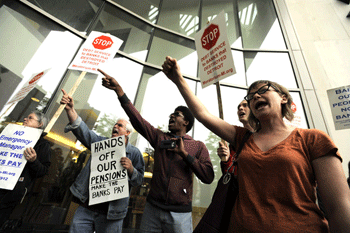The $195 million bailout of bankrupt Detroit that Michigan legislators approved in June prevented steeper cuts to the city’s pensions but does little to solve longstanding pension problems.
Republican Gov. Rick Snyder called the state bailout “a good solution.”
“This is a way we can support one another and again make it Detroit, Michigan instead of Detroit vs. Michigan,” he told reporters after the Senate okayed the measure. The House had approved it two weeks earlier.
But the problems that led to city’s bankruptcy go back decades, and critics say the bailout does little to solve one of the main problems—the failure to properly fund the city’s pension obligations.
The bailout of Detroit played out over a year and involved an estimated 100,000 individual creditors and more than 40 labor unions. The city has experienced decades of population decreases, falling from 1.8 million residents in 1950 to 684,799 as of December 2012. Unemployment in the city reached as high as 23.4 percent in June 2010.
Assets in Art
The debate sparked controversy, with discussions of potentially selling off the city’s art collection from the Detroit Institute of Arts. The Mackinac Center for Public Policy’s Fiscal Analyst Michael LaFaive wrote that the city could get $200 million if it sold just one of its paintings.
“The sale of a single painting would hardly be a death blow to the city,” LaFaive wrote. “The art museum would still contain a magnificent collection of works by Bellini, Van Gogh, Rembrandt, Monet, Degas and many others.”
The deal saves the art, with the help of 12 foundations also committing hundreds of millions of dollars to the rescue. The art museum and its assets would be transferred to a private nonprofit organization. City retirees and workers must approve the deal, but it has the endorsement of union leaders and is expected to win rank-and-file approval.
State Rep. Coleman Young II said, “Yes, the collection of the Detroit Institute of Arts will not be sold off to pay shady bankers who made loans to a city who they knew couldn’t afford it—the definition of predatory lending.”
Then and Now
However, it was Young and the state legislature that passed a bill in 2009 that increased the City of Detroit’s borrowing cap from $125 million to $250 million so it could take on more debt. Taxpayers ultimately picked up the tab, despite assurances by Detroit’s Emergency Manager Kevyn Orr just a year earlier they wouldn’t be asked to do so.
In July of 2013, Orr told Fox News, “We’ve operated on the assumption that we have to cure this problem on our own. We are not expecting the cavalry to come charging in. We are out here at an outpost, and we have to fix it because we dug this hole. That’s the assumption we’re operating on.”
In December of 2013, Orr said in an interview with Public Sector, Inc., “It was made abundantly clear that a state bailout of Detroit’s finances was not a possibility.”
Orr added, “The problems we are addressing are more than 60 years in the making and won’t be solved in a few months.”
The concerns about Detroit’s underfunded retiree pensions were the subject of debate in 1961 at the state’s Constitutional Convention when Michigan’s constitution was changed. Back then, Detroit had underfunded pensions by $1.2 billion when adjusted for inflation. The delegates were concerned Detroit wasn’t putting in enough money to pay for retirement benefits.
Need Seen as Urgent
The underfunding of pensions has to be addressed in 2014, said James Hohman, assistant director of fiscal policy at the Mackinac Center.
“Your employee should not be your biggest creditor,” Hohman said. “One of the only reasons they are asking for a bailout is because they underfunded their pension systems.” When discussions began about the possibility of the city filing for bankruptcy, there wasn’t even agreement on the size of the city’s unfunded pension liability . The city of Detroit said it was just $640 million but Orr’s office had it at $3.5 billion.
And the bailout doesn’t solve any of Detroit’s lingering problems.
Hohman said the city should get out of a defined-benefit contribution plan where pensioners receive an annual pension and replace it with a 401(k) type defined-contribution plan.
Reform Rollback
In an earlier form the Detroit bailout bill would have closed the city’s pension system and shifted new employees into a defined-contribution plan. But that bill was changed in committee, and the shift to the 401(k) type plan was taken out.
Hohman said Detroit has to learn how to operate within its means. The city is allowed by law to collect two taxes available to no other city in Michigan—a utility user’s tax and a casino “wagering” tax—that brought in $221.4 million in 2012.
Detroit also receives $335 per person in state-shared revenue, by far the most among Michigan cities. The second-highest is Pontiac, at $176 per person.





